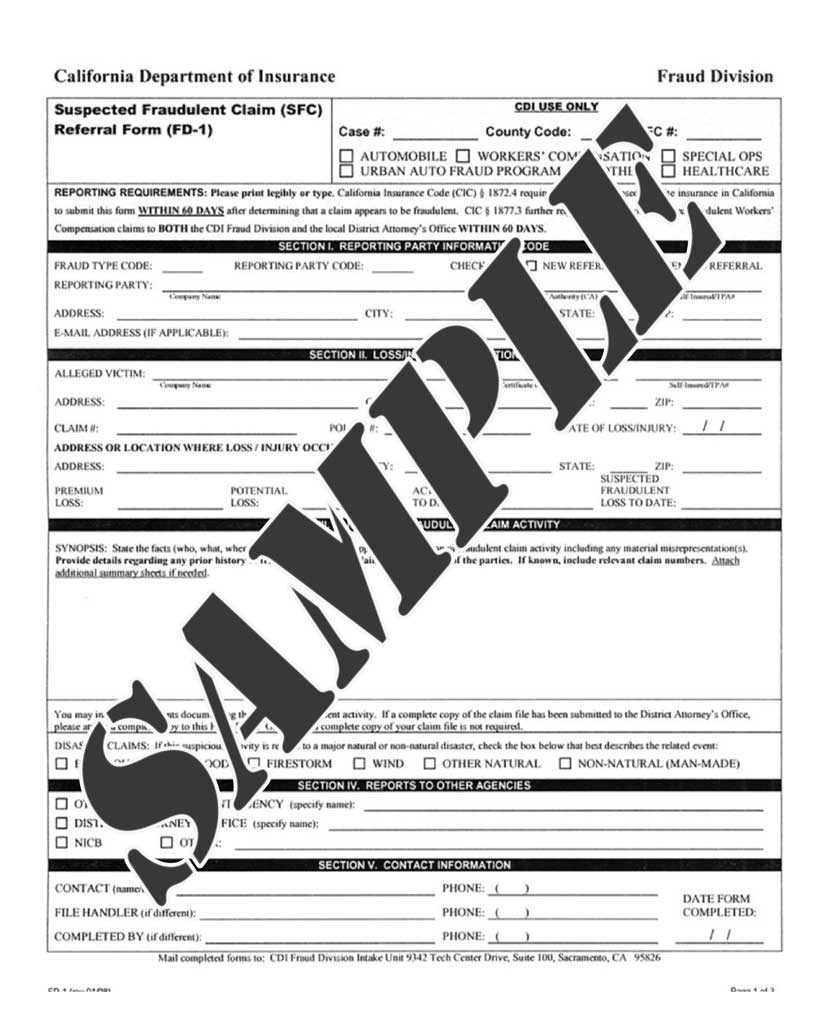Insurance Fraud is a Felony
Table of Contents
- Fraud Division Overview
- What is Insurance Fraud
- Insurance Fraud Costs Consumers
- Common Insurance Fraud Schemes
- Automobile Insurance Fraud
- Workers' Compensation Fraud
- Property, Life and Casualty Fraud
- Disability and Healthcare Fraud
- Billing of Medical Services
- Reporting Suspected Insurance Fraud (General Public)
- Filing a Complaint of Suspected Insurance Fraud (Insurance Industry)
- Fraud Division Regional Offices
- Talk to the Department of Insurance
Fraud Division Overview
Established in 1979, the Fraud Division is the law enforcement unit within the California Department of Insurance and is composed of four separate insurance fraud programs:
- Automobile Insurance Fraud
- Workers’ Compensation Fraud
- Property, Life and Casualty Fraud (property, health, arson, life insurance fraud, and disaster relief)
- Disability and Healthcare Fraud
The Fraud Division Detectives are the leading experts in the field of insurance fraud. They are trained in criminal investigations and provide assistance as well as training to consumers, the insurance industry, law enforcement agencies and the public/private sector.
Fraud Division Detectives are sworn peace officers. They conduct investigations, surveillances, undercover operations and interview witnesses and suspects. Detectives also write and serve search warrants; make arrests and testify in court.
Fraud Division Detectives are also assigned to various local enforcement task forces such as auto theft, computer forensics, underground economy, pharmaceutical fraud and disaster fraud.
For more information, visit the Fraud Division webpage.
What is Insurance Fraud?
Fraud occurs when someone knowingly lies to obtain a benefit or advantage to which they are not otherwise entitled or someone knowingly denies a benefit that is due and to which someone is entitled. Referrals on suspected insurance fraud are handled by the California Department of Insurance (CDI) Enforcement Branch and may be prosecuted as a felony. The punishment for committing insurance fraud ranges from probation, fines, community service, restitution, confinement in county jail and/or state prison. According to the law, the crime of insurance fraud can be prosecuted when:
- The suspect had the intent to defraud. Insurance fraud is a “specific” intent crime. This means the prosecutor must prove that the person involved knowingly committed an act to defraud.
- An act is completed. Simply making a misrepresentation (written or oral) to an insurer with knowledge that is untrue is sufficient.
- The act and intent must come together. One without the other is not a crime.
- Actual loss is not needed as long as the suspect has committed an act and had the intent to commit the crime. No money necessarily has to be lost by a victim.
For more information, please visit the "What is Insurance Fraud" webpage.
Insurance Fraud Costs Consumers
Although the incidents of insurance fraud are frequent and far reaching, its effect on the lives of the general public is seldom recognized. Some of the effects of insurance fraud in California are:
- Insurance fraud totals over $15 billion each year. This costs each resident an average of $500 a year. This results in higher premiums, higher taxes, and higher prices.
- According to the National Insurance Crime Bureau (NICB), other than tax evasion, insurance fraud is the second most costly crime in the country.
- Insurance fraud has a direct effect on innocent, law-abiding citizens. Fraud perpetrators have staged automobile collisions resulting in loss of life, have driven companies out of business, and have performed inappropriate medical treatment on defenseless victims.
- Criminals often target vulnerable groups that include seniors, recent immigrants, and small businesses.
- Many residents do not think about the personal, moral, and economic threat that insurance fraud poses to their everyday lives and their standard of living. This leads to the growing tolerance of insurance fraud.
People who commit insurance fraud vary from first time opportunists, organized criminal rings who conspire to steal millions of dollars from insurance companies and consumers, professionals and technicians who inflate the cost of services or charge for services not rendered, and ordinary people who want to cover their deductible or view filing a claim as an opportunity to make a little money. All lines of insurance are susceptible to fraud, but it is particularly prevalent in automobile insurance, healthcare, and workers' compensation.

If you are solicited to commit insurance fraud, STOP!
Insurance fraud is a felony punishable by up to five years in state prison and a $50,000 fine.
Common Insurance Fraud Schemes
In order to protect yourself from being a victim or an unwilling participant in insurance fraud, it is important to be aware of common insurance fraud schemes. You can view the recent consumer/scam alerts from the Department of insurance here.
Automobile Insurance Fraud
Automobile insurance fraud in California has historically taken several forms. The most common fraud schemes involve automobile property and automobile collisions.
Automobile Property
This type of fraud can involve dishonest auto body and repair shops and/or insurers who may employ a variety of illegal or questionable techniques including:
- Reporting parts of vehicles as damaged or lost when in fact they were not damaged or lost prior to the shop receiving the vehicle.
- Charging an excessive final cost as compared to the original estimate of damage.
- Listing charges for repairs on the billing statement that were not authorized.
- Billing for Original Equipment Manufacturer (OEM) parts, when after-market or salvaged parts were used.
- Billing for OEM parts when bond is used to make repairs.
- Falsely reporting vehicles as stolen, burned or vandalized in order to collect insurance monies or obtain repairs for previous damage.
It is always important for the consumer to carefully review all paperwork from an auto body repair shop in order to protect against potential fraud.
Automobile Collisions
Automobile fraud often involves organized criminal rings. Staged auto collisions follow several basic schemes including:
- Sudden Stop - The driver of the vehicle in front of you stops suddenly for no reason, causing you to rear-end the vehicle.
- Swoop and Squat - A fast moving vehicle swoops in front of the vehicle in front of you, causing that vehicle to brake suddenly, causing you to collide into the "victim" vehicle. A third vehicle has also forced you to remain in your lane so that you cannot avoid the collision.
- Stuffed Passengers - Passengers who were not in the vehicle at the time of the collision.
- Right of Way Collision - An on-coming driver gives you the right of way and waits for you to enter the roadway, and then purposely causes a collision.
If you have been in an auto collision, be cautious of any unsolicited referral to an auto body shop, law office or medical office. Consumers should also be cautious of any auto body or repair facility that makes referrals to medical or legal offices. Organized collision rings and "cappers" actively solicit others in the community to participate in "paper collisions". These collisions only exist on paper and generally innocent parties are not involved. Paper collisions have gained popularity among fraud perpetrators, as they are less dangerous from a bodily injury standpoint, and there is less likelihood of police involvement.
Workers Compensation Fraud
Workers’ compensation fraud schemes can range from staged injuries on the job to complex systems of medical billing for services that were never rendered. The following are some examples of the most common workers’ compensation fraud activities:
- An employee knowingly files a claim for an injury that did not occur on the job or in relationship to the job.
- An employee claims they are unable to do various activities that they can do.
- An employee receives total temporary disability benefits as a result of lying about outside employment, re-employment or their ability to work.
- A medical or legal provider bills for services not provided.
- A medical or legal provider regularly bills for more time than provided.
- An employer discourages an injured employee from filing a workers’ compensation claim.
- A company provides fraudulent information to the insurance carrier in order to reduce their workers’ compensation premiums.
To learn more about Workers' Compensation Fraud, visit the webpage here.
Property, Life and Casualty Fraud
The Property, Life and Casualty Fraud Program handles criminal investigations involving staged commercial/residential burglaries, life insurance fraud (which includes murder for profit cases), fraudulent natural disaster claims (wildfire, flood, earthquake and wind), slip and fall claims, internal embezzlement cases, false food contamination claims, and false marine claims. Criminal investigations in this program area can involve millions of dollars in loss (especially in life insurance fraud cases), multiple claims for the same loss and multiple suspects.
To learn more about Property, Life and Casualty Fraud, visit the webpage here.
Disability and Healthcare Fraud
According to Section 1871(h) of the California Insurance Code, health insurance fraud is a particular problem for health insurance policyholders. Healthcare fraud causes losses in premium dollars and increases healthcare costs unnecessarily.
As mandated by California Insurance Code Section 1872.85(a), funding for the Disability and Healthcare Fraud Program is derived from an annual assessment not to exceed 20 cents annually for each insured under an individual or group insurance policy issued in the State. This funding supports criminal investigations statewide by the Fraud Division and prosecution by district attorneys of suspected fraud involving disability and healthcare fraud.
This program area includes suspected fraud involving: claimant disability other than workers’ compensation, dental claims, billing fraud schemes, unlawful solicitation (usually associated with medically unnecessary surgery claims), durable medical equipment, and posing as another to obtain benefits.
The National Health Care Anti-Fraud Association reports that in the United States, over $2.5 trillion is spent on healthcare every year. Of this amount, between three to ten percent is lost to fraud.
To learn more about Disability and Healthcare Fraud, visit the webpage here.
Billing of Medical Services
The majority of healthcare fraud is committed by a very small minority of dishonest healthcare providers—hospitals, physicians, dentists, pharmacies, etc., and includes questionable or illegal billing of medical services.
The Fraud Division encourages consumers to review their Explanation of Benefits and to compare them to services actually received.
The most common types of fraud committed by dishonest providers include:
- Billing for services that were never rendered -- either by using genuine patient information, sometimes obtained through identity theft, to fabricate entire claims or by padding claims with charges for procedures or services that did not take place.
- Billing for more expensive services or procedures than were actually provided or performed, commonly known as “upcoding”.
- Performing medically unnecessary services solely for the purpose of generating insurance payments.
- Misrepresenting non-covered treatments as medically necessary covered treatments for purposes of obtaining insurance payments - widely seen in cosmetic-surgery schemes in which non-covered cosmetic procedures such as “nose jobs” are billed to insurance companies as medically necessary.
- Falsifying a patient’s diagnosis to justify tests, surgeries or other procedures that are not medically necessary.
- Unbundling - billing each step of a procedure as if it were a separate procedure.
- Billing a patient more than the co-pay amount for services that were pre-paid or paid in full by the benefit plan under the terms of a managed care contract.
- Accepting kickbacks for patient referrals.
- Waiving patient co-pays or deductibles and over-billing the insurance carrier or benefit plan.
Reporting Suspected Insurance Fraud (General Public)
If you are a member of the general public, download and print a copy of the Consumer Insurance Fraud Reporting Form to report suspected fraud. Please complete the form thoroughly with as much detail and information as possible. Reports of suspected insurance fraud may be made anonymously.
Completed Consumer Insurance Fraud Reporting Form and any attachments are to be mailed to the following address:
California Department of Insurance
Enforcement Branch Headquarters
Intake Unit
2400 Del Paso Road, Suite 250
Sacramento, CA 95834
Filing a Complaint of Suspected Insurance Fraud (Insurance Industry)
If you are employed in the insurance industry, download a copy of the FD-1 Form (Suspected Fraudulent Claim (SFC) Referral Form) to report suspected fraud. Please complete thoroughly with as much detail as possible.

Fraud Division Regional Offices
Notification of these types of fraud can be made in person or mailed to:
The California Department of Insurance
Fraud Division Intake Unit
2400 Del Paso Road, Suite 250
Sacramento,CA 95834
The regional office addresses are below. You can view the map of the Fraud regional offices' coverage here.
| Regional Office | Address | Counties Served |
|---|---|---|
| Golden Gate |
1100 Rose Drive, Suite 100 Benicia, CA 94510 Phone: (707) 751-2000 |
Alameda, Contra Costa, Del Norte, Humboldt, Lake, Marin, Mendocino, Napa, San Francisco, Solano, and Sonoma |
| Central Valley |
5737 N Fresno Street Fresno, CA 93710 Phone: (559) 440-5900 |
Fresno, Inyo, Kern, Kings, Madera, Mariposa, Merced, San Luis Obispo, and Tulare |
| Inland Empire |
9674 Archibald Avenue, Suite 100 Rancho Cucamonga, CA 91730 Phone: (909) 919-2200 |
Riverside and San Bernardino |
| Orange |
333 South Anita Drive, Suite 450 Orange, CA 92868 Phone: (714) 712-7600 |
Orange |
| Sacramento |
2400 Del Paso Road, Suite 250 Sacramento, CA 95834 Phone: (916) 854-5700 |
Alpine, Amador, Butte, Calaveras, Colusa, El Dorado, Glenn, Lassen, Modoc, Mono, Nevada, Placer, Plumas, Sacramento, San Joaquin, Shasta, Sierra, Siskiyou, Stanislaus, Sutter, Tehama, Trinity, Tuolumne, Yolo, and Yuba |
| San Diego |
10021 Willow Creek Road, Suite 100 San Diego, CA 92131 Phone: (858) 693-7100 |
Imperial and San Diego |
| Silicon Valley |
18425 Technology Drive Morgan Hill, CA 95037 Phone: (408) 201-8800 |
Monterey, San Benito, San Mateo, Santa Clara, and Santa Cruz
|
| Los Angeles |
5999 East Slauson Avenue City of Commerce, CA 90040 Phone: (323) 278-5000 |
Southern Los Angeles County |
| Valencia |
27200 Tourney Road, Suite 375 Valencia, CA 91355 Phone: (661) 253-7400 |
Northern Los Angeles County, Santa Barbara, and Ventura |
The California Department of Insurance has a Consumer Hotline to serve the needs of the public. If you have any information regarding fraudulent insurance activity, you may call the Consumer Hotline at (800) 927- 4357. All suspected insurance fraud reported to the Consumer Hotline is forwarded to the Fraud Division.
It is important to know that notification of insurance fraud may be made anonymously. The Insurance Code states that no insurer, employees or agents of any insurer, shall be subject to civil liability for libel, slander or any other relevant cause of action by virtue of providing information, in good faith, concerning suspected insurance fraud to law enforcement, including the California Department of Insurance Fraud Division.
Talk to the Department of Insurance
Do you have a question, comment or concern? There are several ways to talk to us:
Call
Call our Consumer Hotline at (800) 927-4357.
Telecommunication Device for the Deaf dial (800) 482-4TTY.
Telephone lines are open 8:00 AM to 5:00 PM Pacific Time, Monday through Friday, excluding holidays.
Write
California Department of Insurance
300 South Spring Street, South Tower
Los Angeles, CA 90013
Visit
Visit us in person on the 9th Floor at the address above.
Office Hours: Monday through Friday 8:00 AM to 5:00 PM Pacific Time, excluding holidays.
More Information & Questions |






